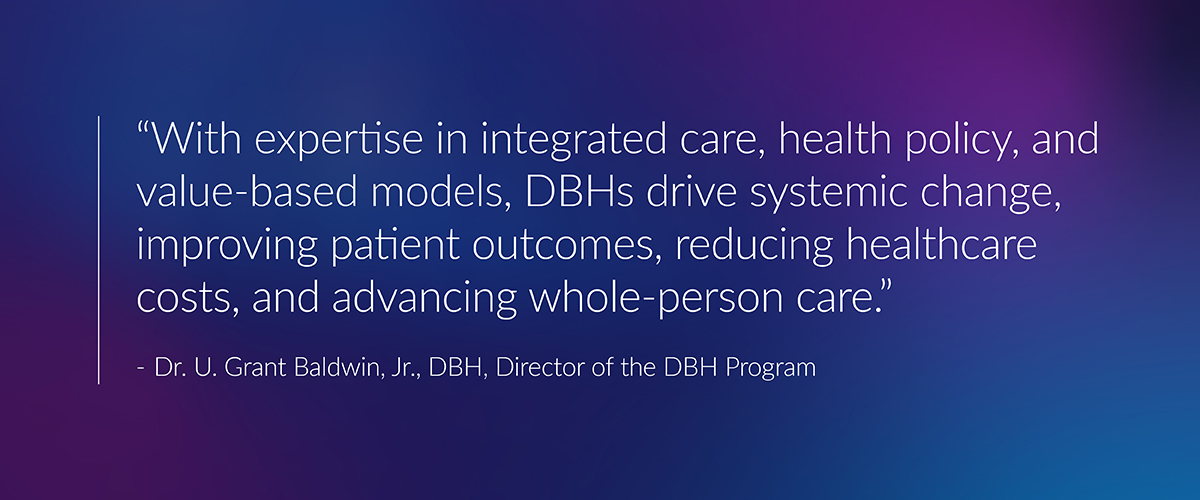CGI Enhances DBH Program with Courses on Publishing, Healthcare Policy, and Value-Based Care
In a rapidly evolving healthcare landscape, the need for professionals who can navigate complex systems, advocate for policy change, improve patient care, and contribute to scholarly research has never been greater. Cummings Graduate Institute for Behavioral Health Studies (CGI) remains at the forefront of innovation by continuously updating its curriculum to meet these emerging demands. To further equip its students with critical skills, CGI has expanded the Doctor of Behavioral Health (DBH) program curriculum to include three new courses designed to enhance expertise in publishing, healthcare policy, and value-based care.
“Continuous curriculum improvement in integrated behavioral health care is essential to preparing clinicians and health care executives who can navigate the complexities of modern healthcare. By refining educational frameworks, we ensure that future professionals are equipped with the latest evidence-based practices, cultural competencies, and interdisciplinary collaboration skills needed to address the evolving needs of patients and communities” said Dr. U. Grant Baldwin, Jr., DBH, Director of the DBH Program.
Expanding Knowledge and Skills
The newly introduced courses exemplify CGI’s proactive commitment to addressing emerging challenges and evolving needs in healthcare. Each course is designed to enhance students’ comprehension of critical issues that are shaping the future of integrated care, behavioral health, and healthcare delivery.
DBH 1201: Publishing in a Scholarly Journal
The ability to contribute to research and scholarly publications is a key skill for behavioral health professionals. This one-credit course provides students with hands-on experience in developing research-based writing, from topic selection and research skills to editing and formatting for publication. Students will also gain exposure to various academic journals and learn the specific requirements for submission acceptance.
DBH 9032: Healthcare Policy and Advocacy
As healthcare continues to be shaped by policy decisions, behavioral health professionals must understand the complexities of legislation, judicial influence, and the policy-making process. This three-credit course focuses on policy implementation and advocacy, equipping students with the skills needed to influence systemic healthcare improvements. Students will explore how policies impact clinical practice, healthcare delivery, and patient outcomes while learning to engage effectively in advocacy efforts.
DBH 9034: Value-Based Care
With the shift from fee-for-service (FFS) to fee-for-value (FFV) models, healthcare professionals must have a strong grasp of how insurance and reimbursement structures impact care delivery. This course provides foundational knowledge of the health insurance industry, exploring key concepts, contract structures, and the challenges of navigating dual payment systems. By analyzing contract language and reimbursement mechanisms, students will gain the expertise needed to lead in value-based healthcare models.
“The development of DBH 1201: Publishing in a Scholarly Journal, DBH 9032: Healthcare Policy and Advocacy, and DBH 9034: Value-Based Care reflects the DBH program’s commitment to equipping students with the skills necessary to drive systemic change in healthcare. These courses were designed in response to the growing demand for behavioral health professionals who can contribute to scholarly literature, influence policy, and navigate value-based care models. By integrating these critical areas, the DBH curriculum ensures graduates are not only competent clinicians and healthcare executives but also thought leaders, advocates, and innovators shaping the future of integrated healthcare,” said Dr. U. Grant Baldwin, Jr., DBH, Director of the DBH Program.
Preparing DBH Graduates for the Future of Healthcare
With these curriculum enhancements, CGI continues to uphold its mission of disrupting healthcare by preparing entrepreneurial integrated care professionals through innovative & affordable quality distance education programs, grounded in the Biodyne Model, and focused on delivering human-centered care, population health improvements, and medical cost savings. These additions ensure that graduates are equipped with cutting-edge skills and knowledge that align with industry demands, financial sustainability in healthcare, and effective policy advocacy.

“Doctor of Behavioral Health (DBH) professionals are shaping the future of healthcare by bridging the gap between medical and behavioral sciences. With expertise in integrated care, health policy, and value-based models, DBHs drive systemic change, improving patient outcomes, reducing healthcare costs, and advancing whole-person care. Their impact extends beyond clinical practice. They are the innovators, advocates, and leaders redefining how healthcare is delivered and experienced,” said Dr. U. Grant Baldwin, Jr., DBH, Director of the DBH Program.
CGI’s Commitment to Continuous Improvement and Industry Leadership
As the healthcare landscape continues to evolve, CGI remains committed to enhancing its curriculum to meet the dynamic needs of behavioral health professionals. These newly introduced courses exemplify the institution’s dedication to staying at the forefront of industry advancements, ensuring that students receive a comprehensive, relevant, and forward-thinking education. For those aiming to pursue an advanced degree that equips them to lead in integrated care, healthcare policy, and value-based care, CGI’s DBH program offers an unparalleled educational experience designed to shape the future of healthcare.
Discover how CGI’s DBH program can equip you with the skills to drive meaningful change in healthcare. Explore the full curriculum, including the latest course additions, here: https://cgi.edu/dbh-curriculum-overview.































